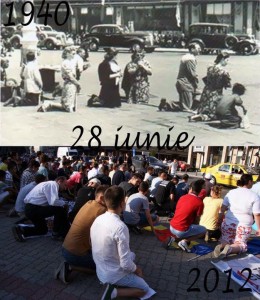On June 28, 1940, Moldova was overrun by the Soviet troops, after it had been given up by Romania. The Soviet Union quickly added it to its territory. What followed were many years of repression under the Soviet Empire. Although undeniable, this fact is still often disputed today: was it liberation or occupation?
Nowadays, June 28 still sparks controversies in the society, with protests and controversial declarations re-occurring every year around the sensitive historical dates. This year was no exception. Protests from both sides took place in Moldova’s capital, Chișinău.
One group, comprised of several political parties and NGOs, gathered in front of the Russian Embassy, to protest against 72 years of the Soviet occupation and demanding the withdrawal of the Russian army from the territory of the Republic of Moldova. The signs they carried, among other things, read, “200 years of occupation – enough” and “We ask for the liquidation of the consequences of the Hitler-Stalin Pact.” The crowd also chanted, “Out, out with the Russian army!” and “Romania, unification!”.
On the opposite side, representatives of the League of Russian Youth and the political movement “Patriots of Moldova” were quoted by the local media as “celebrating 72 years of liberation from the yoke of the royal Romanian occupants.”

In Romania's capital, București, hundreds of people kneeled to commemorate June 28, 1940. Photo by www.basarabia91.net, used with permission.
The street war of declarations was taken to the blogosphere as well.
Valeriu Munteanu wrote [ro]:
Unfortunately, through KGB methods, the occupants managed throughout the years to mutilate the souls and the thinking of thousands of Moldovans, managed to teach them to aversely fight against their own co-nationals and to say loudly: “We were not occupied in 1940, but freed, we thank the Soviet tank and the freight that took our grandparents to Siberia”.
He concluded [ro]:
The occupants, greedy for foreign land, do not let us breathe freely, do not allow us, not even after 70 years after the 1940 occupation, to live the life the way we want to.
On the opposite side, Nicolae Pascaru asked [ro]:
Did the Russians invade us or did the Romanians betray us?
He answered his own question by saying that the Romanians were traitors and they remain traitors.
Blogger Radu Marian is tired of these discussions in the blogosphere. He mentioned [ro] the case of www.vox.publika.md, a platform for commentaries, blogs and opinions, where, according to him, 80 percent of the content was “focused on a discussion without any sense, between two camps of clowns,” where one side believes that “Moldova is the great nation of the humankind” and the other one “is endlessly blabbering utopias about the great Unification between Moldova and Romania.”
Andrian Buligari, on the other hand, commenting on articles about ethnic divisions, wrote [ro]:
Citizens of [the Republic of Moldova] need to be educated, they need to be educated less in extremist, nationalist, Romanophobe or Russophobe directions, on the contrary, they need to be educated in the spirit of patriotism, tolerance, common sense and mutual respect.
Irina Burac brought into attention [ro] the fact that the victims of political repressions in Moldova were confronted with problems even in their own country:
Even in their native country, the victims of political repressions are deprived of compassion, understanding and recognition of their suffering.
According to her, “the special Law on rehabilitation of politically repressed victims, nr.1225 from 08.12.1992, contains a number of contradictory dispositions, which complicate even further the situation of the victims of political repressions”.
Max Ciudin shared the same concerns and mentioned that “the war started by [the Soviets] in today’s territory of the Republic of Moldova on June 28, 1940, is not over yet”:
No matter how cowardly the people who are ruling the country today would be, ignoring own history, the history seen not necessarily from the perspective of the entire Romanian nation, but from the perspective of the piece of the Moldovan land that they disrespect, denying it its suffering brought by the Russian occupiers, this only gives them “the rulers” and the entire state a note of illegitimacy.
The author believes this illegitimacy will continue to mark Moldova's existence for a long time.






